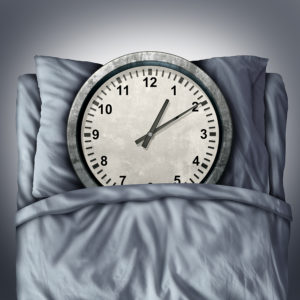 Sleep happens in various stages. These stages of sleep have important impacts on our health, including many aspects of cognitive function. Machines that monitor sleep show that our brain is extremely active during these stages. Stage one is the initial stage where we are a little drowsy and we drift off into sleep. Initially the brain goes from an alpha, or the awake state, to a mixed theta or drowsy state, which is stage two or light sleep. This is the sequence of the power nap. It is easy to awaken from a stage two sleep and feel refreshed. If we stay asleep, we will transition to a deeper sleep with delta wave activity. Stages three and four show slow wave activity on an EEG (which measures and records the electrical activity of the brain, much like an electrocardiogram measures and records the electrical activity of the heart), making it more difficult to wake up, leaving you groggy and listless.
Sleep happens in various stages. These stages of sleep have important impacts on our health, including many aspects of cognitive function. Machines that monitor sleep show that our brain is extremely active during these stages. Stage one is the initial stage where we are a little drowsy and we drift off into sleep. Initially the brain goes from an alpha, or the awake state, to a mixed theta or drowsy state, which is stage two or light sleep. This is the sequence of the power nap. It is easy to awaken from a stage two sleep and feel refreshed. If we stay asleep, we will transition to a deeper sleep with delta wave activity. Stages three and four show slow wave activity on an EEG (which measures and records the electrical activity of the brain, much like an electrocardiogram measures and records the electrical activity of the heart), making it more difficult to wake up, leaving you groggy and listless.
Stage five is referred to as REM sleep, which is the dream state. Often your eyes will twitch, but your body is somewhat paralyzed; you do not move during this stage of sleep, but your brain is extremely active during this time. This is a very important stage of restorative sleep. During stages three, four and five, significant metabolic mechanisms are taking place with the release of hormones, specifically human growth hormone, and the production of various proteins, enzymes, and other hormones that are going to be needed for the next day. It is felt that stage five sleep is extremely important in learning and the ability to retain and process information. The old saying “I will sleep on it” may have scientific validity. It would seem that during this stage of sleep, we actually work out some of our lingering problems and come up with solutions. I am sure you have experienced this phenomenon: you went to bed with a problem and woke up the next day with a clever solution.
These five stages of sleep repeat over and over throughout the evening, but they do vary subtly. In the earlier stages of the evening, they tend to be shorter at around 80 minutes, and then they expand and lengthen later in the evening up to about 120 minutes, cycling on average 4-6 times in normal individuals (Winner, 2008).
References:
Winner, P. (2008). 7 Steps to a Healthy Brain: Think Younger, Look Younger, Feel Younger. Lulu Pub.
